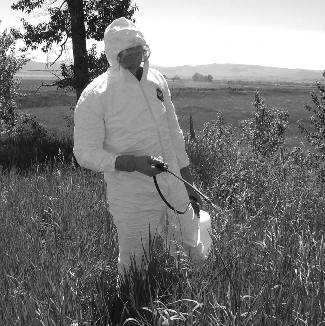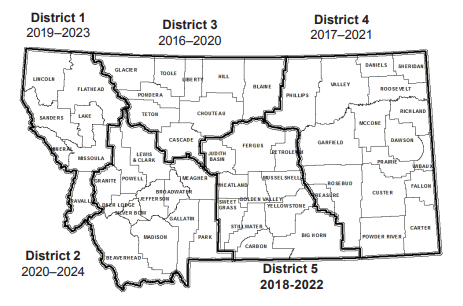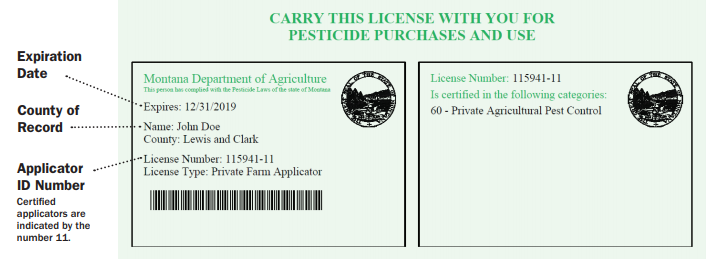
The Montana Private Applicator Program
The Montana State University Pesticide Education Program coordinates the certification needs of private (farm) applicators across the state. A private (farm) applicator is defined in the Federal Insecticide, Fungicide and Rodenticide Act (FIFRA) as an applicator that uses or supervises the use of any restricted use pesticide for the purpose of producing any agricultural commodity on property owned or rented by the applicator or his/her employer.
Last Updated: 02/20by Cecil Tharp, Pesticide Education Specialist, Department of Animal and Range Science, Montana State University - Bozeman; Amy Bowser, Pesticide Education Technician, Montana State University - Bozeman
PESTICIDES ARE AN IMPORTANT TOOL FOR MANY
Montana farmers, ranchers and landowners. Many commonly used ‘general use’ pesticides can be purchased without a license and used on your own property. These pesticides do not generally cause unreasonable adverse effects on human health or the environment and include such products as Ortho, Sevin® and Roundup®. Other ‘restricted use’ pesticides are more strictly regulated and require a license to purchase or apply them due to the potential adverse effects these products may cause the environment, non-target animals or human health. Restricted use pesticides include such products as Tordon 22K®, Warrior 1E® and many more. The Montana State University Pesticide Education Program coordinates the certification needs of private applicators wishing to apply restricted use pesticides across the state. This is a combined effort between the Montana Department of Agriculture and MSU Extension personnel.
There are many things a certified private applicator cannot do that are often misunderstood. Certified private pesticide applicators cannot apply pesticides commercially and can only apply restricted-use pesticides on land they own, rent or lease. A certified applicator also cannot sell or give away pesticides. Finally, a certified applicator cannot give his/her permit to non-family members or non-employees to purchase restricted use pesticides.
Private applicators wanting to purchase or use restricted use pesticides should read this publication. For more information on non-private (commercial, governmental, non-commercial) certification contact the Montana Department of Agriculture, (406) 444-5400 for further details.

The Process of Obtaining Private Certification
To become certified as a private applicator for the first time, you must either attend an approved seven-hour initial training program or pass the open book Montana Private Applicator Exam with a grade of 70 percent or better. This test is offered at all local county and tribal Extension offices and must be administered by a Private Applicator Training (PAT) Coordinator (generally the MSU Extension County or Tribal Agricultural agent). Upcoming Initial Private Applicator courses offered throughout Montana are posted at www.pesticides.montana.edu/pat/initial.html.
If you qualify for certification, a completed ‘Farm Applicator Special Use Permit’ must be sent with the appropriate fees to the Montana Department of Agriculture. The Montana Department of Agriculture will then mail you a private applicator license within 14 days (Figure 2, page 3). The PAT Coordinator may issue a temporary permit to allow the purchase of restricted use pesticides as soon as possible, provided it is the first time you have applied for a license. Temporary permits cannot be issued to applicators who have allowed their certification to expire (within the last 24 months).
If you do not receive your license within two weeks, contact the MDA pesticide licensing division at (406) 444-4900.
Private Applicator Fees
The fee for private pesticide applicators is $60 and is distributed as:
- $15 (25 percent) to the Montana Department of Agriculture for administration.
- $25 (42 percent) to the Extension office of the county in which the private applicator resides. This money is used to support pesticide certification and training programs conducted in those counties.
- $5 (8 percent) to the Montana State University Pesticide Education Office.
- $15 (25 percent) to the Montana Department of Agriculture Waste Pesticide and Pesticide Disposal Program.
The $60 fee is prorated over a five-year recertification cycle. For example, an initial applicator paying fees during the second year of the cycle would pay $48. The payment for the third year would be $36 and so forth. Refer to the Pesticide Certification Districts Map (Figure1) to see what your prorated initial certification fee is.

Figure 1: Montana pesticide certification cycle by districts.
Pesticide Certification Districts / Accruing Recertification Credits
All applicators must accrue six recertification credits by the end of their certification cycle. Recertification credits can be obtained by attending approved training sessions, attending online courses or taking a closed-book exam at the local Extension office. Montana is divided into five districts (Figure 1), with all the private applicator licenses in any given region expiring on December 31st of a given year. If applicators fail to accrue six recertification credits by the end of this cycle, they will lose their current private applicator certification. Applicators who are certified in the fifth year of the certification cycle are automatically grandfathered into the next cycle and do not need to accumulate six recertification credits, however they will need to pay a $60 fee for the next 5 year cycle. Applicators who are initially certified after July 1st of the third year of their certification cycle will only need to accumulate three recertifcation credits. The only way to become certified within the first 12 months of a lapsed certification is to take a closed-book exam at the county MSU Extension office or attend a private applicator initial certification program.
An applicator may elect to take a closed-book exam (pass with a score of 70 percent or better) at any time during the fifth year of the certification cycle to qualify for the next cycle.
As a certified private pesticide applicator you are responsible for maintaining your license. You are also responsible for keeping track of the programs you attend. Do not procrastinate or you may be caught at the end of the cycle without any program credit opportunities in your local area. You have five years to attain six recertification credits. All program credit opportunities available in Montana are located at https://mtplants.mt.gov/ by selecting ‘Pesticide Programs’ from the left sidebar then ‘Course Locator’. Be sure to enter ‘60 - Private Agricultural Pest Control’ under ‘Category’ to see courses approved for private applicator credits. If you have any questions regarding other program opportunities contact your MSU Extension Office. For accessing recertification credits accumulated on your license navigate to https://mtplants.mt.gov/ and select ‘Pesticide Programs’ and ‘Pesticide License Search’.
Contact the Montana Department of Agriculture if you find errors in your credit information or need to update your contact information at (406)444-5400. For other questions contact the MSU Pesticide Education Program.
Figure 2: Your private (farm) applicator license.

Applicator ID Number
Certified applicators are indicated by the number 11.
What Can I Expect if I Qualify for Recertification in the Next Certification Cycle?
If you have qualified for recertification in the next cycle by accumulating six recertification credits or passing a closed- book exam, you will receive a notice from the Montana Department of Agriculture in mid-to-late November of the recertifying year. This renewal letter will indicate whether you qualify for recertification and ask for your payment of $60 for the next cycle. If you do not pay the $60 fee, you will not be recertified in the next cycle. Contact the Montana Department of Agriculture if you have paid your fee and still have not received your license.
Your License and Applicator ID Number
You will receive your license (Figure 2) from the Montana Department of Agriculture within two weeks of initial certification. You should be aware of your applicator ID number, your expiration date and your county of record.
County of Record. Your county of record is usually the county where you reside within the state. This is important, as the local county you are registered in tracks your individual records and recertification credits. Your records are forwarded to your local county PAT coordinator. This is usually based on your address information given when you apply for the initial certification. If you move to a different address, be certain to contact the Montana Department of Agriculture and you’re county MSU Extension agent to update your information.
Applicator ID Number. The private applicator ID number ends in -11. Your applicator ID number is needed to verify attendance at any private applicator recertification credit opportunity event.
Expiration Date. The expiration date is the last day that your certification will be valid. This marks the last day in your certification cycle for the region in which you reside. You must have accumulated six recertification credits or have taken a closed-book exam (passed with a score of more than 70 percent) on or before the expiration date to requalify for certification in the next cycle. If you are certified in the final year of your certification cycle, you automatically qualify for recertification in the next cycle (Figure 2).
Online Credit Opportunities
Online credits are available to all Montana private applicators. This opportunity is available on the Montana Department of Agriculture course locator tool at: https://mtplants.mt.gov/PesticideApplicator/MeetingSearch.aspx by selecting ‘online’ under ‘Meeting Type.’ Make sure to select ‘60 - Private Agricultural Pest Control’ under ‘Category’ to find courses with credits for the private applicator license.
Each applicator has the opportunity to gain up to six credits within one certification cycle through the online process. Many online tests are currently available and include topics on pesticide safety, calibration, record keeping, pesticide labels and personal protective equipment.
Online credit directions may vary so applicators must read and follow all directions by each online credit provider.
Online opportunities should be viewed as a last resort to applicators. Priority should always be given to attending regular programs that focus on interaction, deliver valuable pesticide updates and valuable feedback. This online credit opportunity should supplement the already existing credit opportunities within your county.
Purchasing Restricted Use Products
The Montana Department of Agriculture registers approximately 11,500 pesticide products in Montana. These products are either registered as restricted use or general use products that may be purchased by anyone.
Restricted use pesticide product labels will contain the statement, “RESTRICTED USE PESTICIDE”, on the top of the first page. A local vendor or dealer will ask for your private applicator certification when purchasing a restricted use pesticide product. If you do not have a current private applicator certification you will not be allowed to complete the purchase. Always keep your license with you when purchasing pesticide products and never purchase restricted use pesticide products for others.
Reference Materials
As a certified private applicator, it is your responsibility to use pesticides in a manner consistent with the product label, while following all state and federal laws regarding your pesticide applications, storage and disposal. Using reference materials to answer questions is an invaluable tool for Montana private applicators who find themselves in remote locations where quick answers are needed. All applicators should have a copy of the EPA Core Manual and Montana Addendum and be familiar with the MSU Pesticide Education Program Web site. In addition, private applicators using fumigants for vertebrate pest control or structural pest control have the opportunity to obtain the non-soil fumigant manual for private applicators. These manuals can be viewed online at www.pesticides.montana.edu by selecting the ‘Publications & Resources’ link on the left sidebar. These manuals can also be ordered from MSU Extension at (406)994-3273.
For questions on new pesticide products available, products delisted by EPA, new pesticide laws, and pesticide news stories of Montana interest see the MSU Pesticide News Source at www.pesticide.montana.edu. Select ‘Pesticide News’ on the home page. By periodically reviewing this site, a private applicator can stay current on new events in the pesticide world that may impact their operation.
The MSU PEP home page also has a link titled ‘Publications & Resources.’ On this page you will find a comprehensive list of MontGuides, websites, and Extension bulletins related to a variety of pesticide subjects an applicator may have questions about. These are the same resources used at pesticide programs around the state.
For More Information
Contact your local MSU Extension office or the MSU Pesticide Education Program office at:
Certification is not needed for immediate family members or employees of certified private applicators unless the pesticide product label specifies. All uncertified family members must be trained and supervised by the certified applicator.
Remember: Keep your Private Applicator License with you for all private applicator credit opportunities. To attain recertification credits you must attend the entire event, as well as mark your applicator ID number and signature on the attendance sheet for the event. Credits will not be awarded if applicators fail to mark this information.

